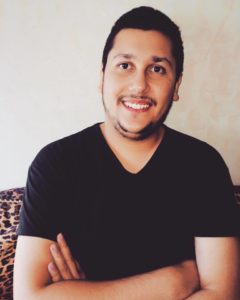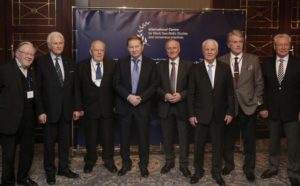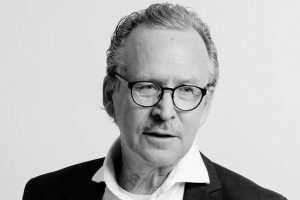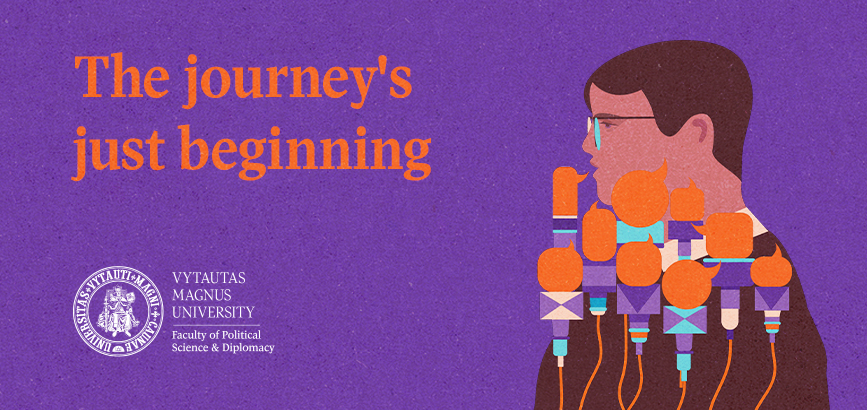Interview with a student of our Faculty
 Interview with Mohamed Zakaria Belmehdi, a student of Bachelor study programme International Politics and Development, about his political science studies at Vytautas Magnus University. M. Z. Belmehdi is VMU Ambassador from Marocco.
Interview with Mohamed Zakaria Belmehdi, a student of Bachelor study programme International Politics and Development, about his political science studies at Vytautas Magnus University. M. Z. Belmehdi is VMU Ambassador from Marocco.
Why did you choose to study in International Politics and Development study field and why from all other universities did you choose to study at Vytautas Magnus University?
For me I’m attracted to political science, the subjects of the program attracted me as well as the description about individual subjects and the program. Before coming to Vytautas Magnus University I’m was searching about a suitable political science program in English language, plus Lithuania attracted me the most.
Since you are studying in your last semester, could you please describe what experience have you received from VMU International Politics and Development studies?
Studying in VMU International Politics and Development Studies, have deepen my knowledge about political science in general and also about politics in some other regions of the world, I would say that now I’m more knowledgeable in the field than when I came in my first year, although I still need to do more efforts.
What did you like the most in VMU? Could you please describe VMU’s advantages and disadvantages?
It’s very hard to say one thing exactly, I’m satisfied 99% with my studies and the university. I like most of the subjects, most of the professors, the education system, the events and activities.
VMU advantages: high quality of education, flexible and decentralized system of education, a lot of students activities and events, international environment in both teaching staff and students, friendliness within the teaching and administrative staff and of course students, modern and rich library.
VMU disadvantages: I guess the A and B groups system should be reformed or abolished, and also we should learn from the first year how to write academic paper properly.
Had you any additional activities while studying? Did you participate in university clubs or organisations; other organizations? What did you gain from these activities? In case you did not participate, please clarify why? What could you recommend for younger colleagues?
Of course, I would describe myself as the most active international student in VMU, I was taking part in almost every event organised by ESN, and later on I join them, I took part in events of other organisations such as APK, Asians clubs, etc…
It was useful for me especially clubs that are oriented toward politics I learned a lot and had chance to express myself. In others I had fun, and in others I learned about other cultures, also sometimes you meet some wonderful people.
However unfortunately, there are three main challenges, some organisations are not open to foreign students, others are totalitarian organisations and they don’t accept the others opinion and also I don’t know what is wrong with recent international students but many of them are not interested in taking part in extracurricular activities.
For younger colleagues, I would suggest them to be more active, to be ambassadors of their cultures. Many students want to know about others cultures.
Have you participated in Erasmus + or bilateral exchange programmes? If yes, was it beneficial? What experience have you gained? Have the studies in foreign countries any differences? If no, why did you not you embrace the opportunity?
Unfortunately, I never been as an Erasmus student, for personal reasons as well as the fact that the third and fourth year of studies are very interesting to be missed, on the other hand I took part in Erasmus Internship in Plzeň (Czech Republic), and it was interesting to learn about another country culture and see how is it life there.
What are your plans and dreams for the near future? Do you plan to link your future with your study programme?
I would like to continue my master studies, and in this case I’ll jump directly to the next question.
Do you plan to study Master degree? If yes, what programme do you plan to study?
Yes, I would like to study International Relations and Diplomacy master in VDU, however I wish if a new program of political science will be open, preferably something about Eastern Europe politics.
What could you wish for students who dream/plan to study in VMU Faculty of Political science and Diplomacy?
I would simply say, if you want to study in a high quality education, in an international environment, and having fun, then VMU is the right place for you, and of course the student should be interested and love political science, then PMDF is the right place.
In which study programme do you study?
4th year International Politics and Development Studies.
Interview prepared by Jūratė Vietaitė
Cooperation between VMU and EHU
 On March 25th it was Open Door Days at the European Humanities University (EHU) in Vilnius. The Open Door Days participants were mainly from Belarus who intend to study in Lithuania in bachelor or master level. Many prospective students were interested in joint-degree programme “World Politics and Economy” which is common programme between VMU and EHU since 2015.
On March 25th it was Open Door Days at the European Humanities University (EHU) in Vilnius. The Open Door Days participants were mainly from Belarus who intend to study in Lithuania in bachelor or master level. Many prospective students were interested in joint-degree programme “World Politics and Economy” which is common programme between VMU and EHU since 2015.
European Humanities University is often named as the Belarusian university in exile. Founded in Minsk in 1992, EHU became a “university-in-exile” in 2004 after it was shut down by Belarusian authorities for standing up against attempts to undermine its academic freedom.
Vytautas Magnus University (VMU) has supported the EHU activities since its establishment in Lithuania. VMU professors gave lectures to Belarusian students and advised the development of new and improvement of old programs.
The new stage of cooperation between VMU and EHU began three years ago when common undergraduate program in English language was developed and implemented. Half of the studies period, students spend the first and the fourth years of study in Vilnius and another part, the second and the third years of study in Kaunas, Vytautas Magnus university. The study process is common and supervised by joint study committee of both universities.
Assoc. Prof. Andžej Pukšto, Head of Department of Political Science (VMU) says : “This is unique program both in Lithuania and Central and Eastern European level“.
The main goal is to learn the students to analyze the functioning of contemporary political systems, also assess the specific features of the free market both in Europe and around the world. In addition, teachers paid more attention to the development of international relations and macroeconomic processes.
Assoc. Prof. Andrei Stsiapanau, the Head of Department of Social Sciences (EHU), is very satisfied with the adaptation of the second-year students in Kaunas, most of them reached perfect academic results.
Interest of the program “World Politics and Economy” especially has grown this year, it obliges us to take care of the quality of studies, to think about attraction of new social partners.
Competition for the Erasmus+ Traineeship Grants
 All fulltime degree students who would like to participate in the competition for Erasmus+ student or Erasmus+ recent graduate traineeship scholarships should submit their application documents until 23/04/2017.
All fulltime degree students who would like to participate in the competition for Erasmus+ student or Erasmus+ recent graduate traineeship scholarships should submit their application documents until 23/04/2017.
Application Documents:
– application form;
– confirmation of the host organization / enterprise (according to the International Office confirmed form);
– recommendation of the faculty member (only for recent graduates traineeship).
Selection Criteria :
– student’s motivation;
– good knowledge of the language which will be used during the traineeship;
– student’s work, study, traineeship, participation in the international / academic projects, social activities experience in Lithuania and abroad;
– conformability between the chosen traineeship and student’s study programme;
– study results (first year master degree students should attach transcript of records of their bachelor / master degree to the application form).
Priority is given:
– to students whom placement is an obligatory part of their study programme;
– to students who have never been Erasmus traineeship student before.
Placement period – from 2 to 4 months (the latest date of the ending: for student traineeship – 29/09/2017, for recent graduates – in a year after graduation).
Competition results will be sent to every participant via e-mail as well as published in the VMU web site and Information boards on the 3rd of May, 2017. For more information please visit VMU webpage (www.vdu.lt/en/studies/internships/erasmus-traineeships/).
Last year students cannot participate in the competition for Erasmus+ student traineeship grants. Only last year students can participate in the competition for Erasmus+ recent graduate traineeship scholarships. Students, who have already used more than 10 months of their Erasmus studies and traineeship mobility in the study cycle they are studying now, cannot participate in the competition. Non EU citizens must acquire TRP or RP before the start of the traineeship.
Upon faculties decision there might be some extra criteria added or/ and criteria prioritized. For more information please contact international relations coordinator in your faculty.
Students with disabilities or special needs are eligible for extra funding to cover extra cost occurring (due to disability or special need) during the mobility. Please contact the coordinator.
Public Lectures of Visiting Assoc. Prof. E. K. Rašidagić
 On 11-12th of April a visiting assoc. prof. Assoc. Prof. Ešref Kenan Rašidagić (University of Sarajevo) will be give a public lectures in the Faculty of Political science and Diplomacy:
On 11-12th of April a visiting assoc. prof. Assoc. Prof. Ešref Kenan Rašidagić (University of Sarajevo) will be give a public lectures in the Faculty of Political science and Diplomacy:
11-th of April, 4.15 pm., campus Putvinskio street 23, hall 311 – The role of regional powers in foreign policy decision making in small states in the Western Balkans.
12-th of April, 11 am., campus Gedimino 44, hall 203 – Can we talk about political Islam in Bosnia?
The lectures are open and everybody is welcomed to participate.
Call for Abstracts for Annual Conference
 3rd Annual Conference: ‘Contemporary Political Processes: Challenges and Opportunities”
3rd Annual Conference: ‘Contemporary Political Processes: Challenges and Opportunities”
The 3rd annual conference ‘Contemporary Political Processes: Challenges and Opportunities’ will take place on 27th April, 2017, during “Faculty days” event.
It is organized by the Faculty of Political Science and Diplomacy and hosted by Vytautas Magnus University. The conference aims to advance studies on various fields within the discipline of political science and provide young scholars with an opportunity to share their research.
Due to the emphasis on young scholars, master and doctoral students are especially encouraged to submit their proposals within these broad thematic fields:
- Lithuania in the Global World
- Contemporary Changes in Global Security;
- Regional Studies;
- Challenges to Governance and Public Administration;
- News outlets, social media and information warfare;
- Resolution of Contemporary Conflicts;
- Other thematic fields are welcome.
Conference languages: Lithuanian and English
Abstract should be submitted to Giedrius Cesnakas via e-mail (giedrius.cesnakas@vdu.lt). They cannot exceed 200 words and are expected to be submitted until 3rd April, 2017.
Best presentations will be considered for publication in peer-reviewed journal “Lithuanian Foreign Policy Review”.
Organization Committee:
Dr. Gerda Jakštaitė
Dr. Giedrius Česnakas
Dr. Gintarė Žukaitė
PhD. candidate Justinas Juozaitis
DhD. candidate Brigita Lokė
For further inquiry: Giedrius Česnakas (giedrius.cesnakas@vdu.lt; 868072207)
Former Heads of State from CEE Met at Forum in VMU
 On Friday 10 March, 2017, Vytautas Magnus University and Kaunas City Municipality co-hosted the first event dedicated to the approaching Centennial of the Restoration of the State of Lithuania– the 2nd Forum of the Baltic and Black Seas, a discussion with the historical leaders, former heads of state from Central and Eastern Europe.
On Friday 10 March, 2017, Vytautas Magnus University and Kaunas City Municipality co-hosted the first event dedicated to the approaching Centennial of the Restoration of the State of Lithuania– the 2nd Forum of the Baltic and Black Seas, a discussion with the historical leaders, former heads of state from Central and Eastern Europe.
The theme of the forum is “Europe Today. The Baltic Consensus (1987–1991): Historical Significance and Lessons for the Today’s World”. On the eve of 11 March, the Day of Restoration of Independence of Lithuania, the historical leaders, along with the academic community and other political, cultural and social figures, invited everyone to revive the historic memory, to look for new forms of dialogue, and to seek productive, good-neighbourly, responsible, and peace-promoting communication that is based on mutual trust and respect.
According to the EU Ambassador in Russian Federation, Vygaudas Ušackas, the success story of the Baltic States is like a beacon for the countries of the Black Sea region in their way of continuous development towards democracy, free market and mature civil society. “Amid geopolitical tensions, confrontations and threats it is worth listening to the wisdom of historical leaders who played a significant role in the collapse of the Soviet Union and the reestablishment of statehood of their respective countries. Aiming to inspire faith in a dialogue and communication, Kaunas has summoned historical leaders in the name of security and prosperity, from the Baltic Sea to the Black Sea and far beyond”, the Ambassador underscored the importance of the event.
It is no coincidence that the former Presidents of Bulgaria, Estonia, Latvia, Poland, Lithuania, Moldova, Slovakia, and Ukraine joined the search for solutions in an academic venue. In the face of global challenges and regional threats of the 21st century, it is necessary to remember the national struggles for democracy and freedom and to engage in a closer dialogue with the academic community, especially the young generation.
“It is both symbolic and meaningful that the forum will take place at Vytautas Magnus University: after being re-opened on the eve of the country’s independence by Lithuanian and diaspora scientists and intellectuals, this university became one of the first heralds of Lithuania’s freedom and a hub of humanist worldviews. Today, as we are standing once again at the doorstep of change, we call on everyone to turn to the ideals that led us towards democratization. In the name of peaceful solutions, we open the door for dialogue between the state and the citizens”, VMU Rector Prof. Juozas Augutis stated, highlighting the significance of universities in the considerations of the future.
The anticipated participants of the Forum of the Baltic and Black Seas included former European heads of state who in the recent past dared to change the course of Europe, to steer it towards democracy and to strive for an active civil society in independent countries: Valdas Adamkus (Lithuania), Vytautas Landsbergis (Lithuania), Viktor Yushchenko (Ukraine), Bronisław Komorowski (Poland), Leonid Kravchuk (Ukraine), Leonid Kuchma (Ukraine), Petru Lucinschi (Moldova), Arnold Rüütel (Estonia), Petar Stoyanov (Bulgaria), Rudolf Schuster (Slovakia), Valdis Zatlers (Latvia), Gennady Burbulis (Russia).
In the 1st Forum of the Baltic and Black Seas, which was organized in 2016, its participants signed the Kiev Manifest, which named the mission of united and purposeful peacekeeping as their goal. “Our common goal is to promote a system of values that is based on joint actions and ensures mutual understanding and support, along with a dialogue between generations and ideologies, the people and the state”, the manifest said.
The region of the Baltic and Black seas, which has been shaped by the diversity of nationalities, faiths, and cultures, has a long and shared history. The former heads of state emphasize that it is only democracy, peace, and complete renouncement of war and aggression that can help the European community of nations to ensure security in the region.
The event was organized by Vytautas Magnus University and Kaunas City Municipality. The forum was also supported by the project of the European Union “Public Diplomacy. EU and Russia”.
Historical leaders, participants of the Forum of the Baltic and Black Seas:
- Valdas Adamkus, President of Lithuania (1998–2003 and 2004–2009), VMU Council Chairman, Honorary Doctor
- Vytautas Landsbergis, the first head of state of the re-established independent Republic of Lithuania, the Chairman of the of the Supreme Council of Lithuania (1992, 1996–2000), VMU Honorary Doctor
- Viktor Yushchenko, President of Ukraine (2005–2010)
- Leonid Kuchma, President of Ukraine (1994–2004)
- Petru Lucinschi, President of Moldova (1996–2001)
- Arnold Rüütel, President of Estonia (2001–2006)
- Lech Wałesa, President of Poland (1990–1995)
- Gennady Burbulis, Secretary of State of the Russian SFSR (1991–1992)
During the conference, exhibition The Baltic Way by VMU professor, photographer Romualdas Požerskis was exhibited at the lobby of VMU Great Hall (28 S. Daukanto g., Kaunas). The exhibition captured the historical period when the leading positions in Europe were occupied by some of the conference participants.
“Lithuania stands for the spirit of freedom kept alive by thousands and thousands of people – a spirit that survived Siberian frosts, betrayals by Soviet secret service collaborators, and the horrors of the gulag. Romualdas Požerskis managed to capture this ultimate aspiration in his photo exhibition and photo album “Lithuania in 1988-1993″. For many years Lithuania had been suppressed by a brutal force which crossed our border in 1940 through deception and blackmail with unconcealed intent to stay forever. Lithuania resisted the foreign army: the partisants, dissidents, the entire nation had never lost hope to regain freedom and independence”, President of the Republic of Lithuania Dalia Grybauskaitė is quoted in the introduction of the exhibition.
Seminar about Russian Threats in Central and East Europe
 VMU Political Science and Diplomacy Faculty in cooperation with the The John Paul II Catholic University of Lublin (Poland) is pleased to announce the joint panel discussion “Countering Information Threats in Central and Eastern Europe”.
VMU Political Science and Diplomacy Faculty in cooperation with the The John Paul II Catholic University of Lublin (Poland) is pleased to announce the joint panel discussion “Countering Information Threats in Central and Eastern Europe”.
The panel discussion will be held on 8th of March, 1:15 p.m.- 2:45 p.m., V. Putvinskio str. 23 – 311.
During this event scholars from the Institute of East-Central Europe and Catholic University of Liublin will present their researches.
Main goal of seminar is to introduce a specify of hybrid war, manipulations in media and other instruments, which helped for Russia to annex and to rule a part of Ukrainian territory. Also it will be presented models of Russian propaganda in the West, main directs and instruments of information strategy of Russia abroad.
Main discussant of seminar – prof. Gintautas Mažeikis, moderator – assoc. prof. Andžej Pukšto.
Public Lecture of Finland Ambassador Ch. G. Michelsson
 7th of March 16:15 public lecture “Challenges and Opportunities for the Foreign Policy of Finland in the NB-8 Region” by the Ambassador of Finland Christer Gustaf Michelsson will be held in the Faculty of Political science and Diplomacy (Gedimino str. 44-202). The lecture is open and everybody is welcomed to participate.
7th of March 16:15 public lecture “Challenges and Opportunities for the Foreign Policy of Finland in the NB-8 Region” by the Ambassador of Finland Christer Gustaf Michelsson will be held in the Faculty of Political science and Diplomacy (Gedimino str. 44-202). The lecture is open and everybody is welcomed to participate.
Finland Ambassador Christer Gustaf Michelsson has an impressive diplomatic career. Previously, he was also an Ambassador in Armenia, Georgia, Azerbaidzhan, Ukraine. He is accredited to Lithuania starting from 2016.
Public lectures by a visiting professor
 22-23 February, public lectures by prof. Alpo Rusi, visiting professor at Vytautas Magnus University, will be held.
22-23 February, public lectures by prof. Alpo Rusi, visiting professor at Vytautas Magnus University, will be held.
Prof. A. Rusi served in the Foreign Ministry of Finland in several assignments (Hamburg, Copenhagen, New York, Bonn), and from 1994 to 1999 as foreign policy adviser to the President of Finland Martti Ahtisaari. He also served as EU Coordinator for the Sarajevo Summit 1999 and deputy Coordinator of the Stability Pact for Western Balkans in 1999-2000. He worked as professor of International Relations, 2000-2003, at Lapland University and in Hamburg. Later on 2007-2009 he was senior adviser in the Cabinet staff of the President of the UN General Assembly.
A. Rusi was from 2009-2014 the ambassador of Finland to Switzerland, with accreditation also to Liechtenstein and the Holy See. A. Rusi is a recognized scholar in the field of international relations and history of Finland, and has published several books in Finland, and in the United States and Great Britain.
| Date | Place | Topic |
| February 22, 14:35 | Gedimino str. 44 – 303 | The Baltic Sea Region Security developments under the Presidency of Donald Trump |
| February 23, 11:15 | V. Putvinskio g. 23-310 | The international system change- a deepening conflict between the US and China- A new Post Liberal World Order in Emergence |
Public Lecture of Danish Ambassador Dan. E. Frederiksen
 Danish ambassador Dan E. Frederiksen gave a public lecture “DENMARK IN THE WORLD: foreign policy priorities and actions” and met the Faculty’s community by on March 2, 2017.
Danish ambassador Dan E. Frederiksen gave a public lecture “DENMARK IN THE WORLD: foreign policy priorities and actions” and met the Faculty’s community by on March 2, 2017.
The ambassador presented Danish foreign policy and discussed the measures of how a small country as Denmark might use while conducting foreign policy. The friendship, bilateral relations, historical ties between Lithuania and Denmark were discussed as well.
Danish Ambassador Dan E. Frederiksen has an impressive diplomatic career. Previously, he was also an Ambassador in Uganda, South Africa and other African countries. He is accredited to Lithuania from 2015.





















